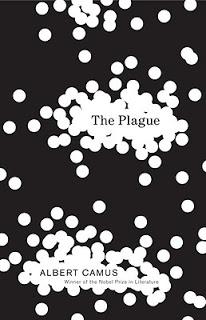
Published in 1947.
Albert Camus wrote The Plague, a novel about a plague occurring during the 1940s in Oran, an Algerian town.I decided to spend the month of April 2020 reading this novel, given the way that COVID-19 has dominated the attention in most venues--from international news to dinner table conversations.
The book has 30 chapters, so I was able to focus on a chapter a day.
Reading a fictional account gave me the opportunity to gain a little distance from my own experience. The two main narrators of the novel--Dr. Rieux and Mr. Tarrou--record their response to Oran's plague.
Camus' novel does not strive for historical or scientific accuracy. Instead, it's an exploration of the meaning of suffering, the meaning of life, and how people create purpose, .
For a more detailed summary, see my Goodreads Review, which is more about describing each "tree" and not so much about "the forest."
I found some parallels between this fictional plague and the current pandemic. Initially, people dismissed signs of the plague, thinking that this was something from the history and not a present threat. They didn't want to induce panic. But after an increase of deaths, the town was put into quarantine.
Next, the officials (doctors, civic leaders, the press, and religious leaders) believed that they could use the tools of their institutions (science, efficiency, truth, obedience to God) to control the plague. They soon found this to be impossible.
Panic then set in--taking various forms from dread, hording, grief, heroic acts, criminal activity, and violence. The "new normal" took various forms, but everyone's lives were changed. After eleven months, the plague subsides, but people were forever changed by it.
While the book does describe a number of practical responses, the bulk of the novel depicts a handful of men describing their fairly philosophical musings about the meaning of life. The absence of women's voices is deafening, but complaining about that won't result in a revised novel.
The men who muse have these occupations: a journalist, a criminal, a businessman (who is an avid diarist), a priest, a doctor, a civic leader (who works in vain on a novel), and a camp organizer.
Some maintain a faith in God. however, the key narrator--Dr. Rieux--takes an agnostic position. Nevertheless, he believes that people are ultimately good and that all should show kindness towards others, even if the efforts are in vain.
A decade later, Camus won the Nobel Prize for literature for the body of his work. He was a significant contributor to the philosophical movement Existentialism. Reading this novel is an easier introduction to that school of philosophy than reading a non-fiction work on the topic.
Others may not have to spend a month reading The Plague, but I wouldn't recommend reading it over a weekend. The novel poses significant questions about the human condition, which requires some meditation.
Related:
King Lear: One Play, Two Views
Olive Kitteridge: Book Review
Tinker: 2010 Pulitzer Prize Award Winner

